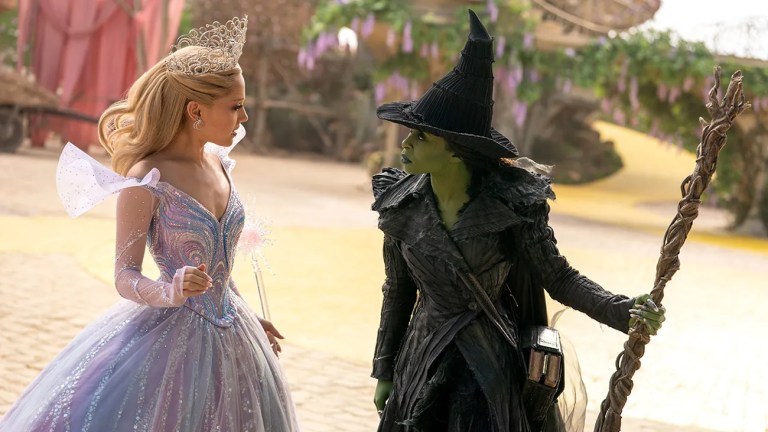Wicked: For Good Box Office Proves Splitting Musical in Two Was Right Call
Despite what critics say, Wicked: For Good defied gravity and all expectations this past weekend, suggesting that breaking mega musicals in two is the way of the future.

Like a ship blown from its mooring by a wind off the sea, or like a seed dropped by a sky bird in a distant wood, it’s safe to say that the November box office has been changed for the better, because it knew Wicked: For Good.
If you can pardon us for bastardizing a few bars of Stephen Schwartz for a moment, that is still the best way to digest what just occurred over the weekend when Wicked 2 opened to an outstanding $150 million in the first three days at the North American box office and a further $226 million worldwide. For context, that not only soars above the first Wicked’s impressive $113 million debut one year ago but also is the second highest domestic opening of the year, coming in only behind A Minecraft Movie’s $163 million debut in April. It also is the third highest domestic opening ever for the month of November, coming in just behind Black Panther: Wakanda Forever ($181 million) and The Hunger Games: Catching Fire way back in 2013 ($158 million).
For theater owners, this is the exact kind of gravity-defying act exhibitors have prayed for after the worst October in nearly a decade when not counting the COVID-effect on 2020. And in a 2025 where superhero movies based on beloved characters like Superman and the Fantastic Four can only open respectively to $125 million and $118 million, having Cynthia Erivo’s Elphaba and Ariana Grande’s Glinda float and/or bubble above the once sure-things of superhero entertainment is a godsend.
Even Universal, which has had a pretty rosy year already thanks to Jurassic World: Rebirth and How to Train Your Dragon, must be feeling extra magical. After all, neither of those franchise films cleared $100 million in their North American premieres while Wicked: For Good has an excellent lane to dominate the holiday season corridor, even with Zootopia 2 opening this week from Walt Disney Animation Studios. That will cut into Wicked 2’s box office some, but the first Wicked cleared $750 million globally despite competing against Moana 2 over last Thanksgiving. And given its larger opening and Wicked: For Good’s still sterling “A” CinemaScore, the sequel seems likely to do even better despite the talking zoo animals. Furthermore, there’s nothing significant to challenge either film until Avatar: Fire and Ash nearly a month from now.
Cumulatively, this shows Universal Pictures made a shrewd and potentially game-changing decision when it decided to break Schwartz’s stage musical phenomenon into two films rather than one. Artistically, and certainly critically, the move can be challenged as commercial or cynical. In my review of Wicked: For Good, I found the second movie suffered significantly from the divide since Act Two of the stage show is not nearly as compelling as Act One. Asking to stand on its own without the best songs, character moments, or larger narrative context did it no favors. Yet one thing critics need to always keep in mind is they are not the target audience for an all-ages spectacle like this.
And as demonstrated by the “A” CinemaScore, Wicked: For Good is working with glowing word-of-mouth among its intended target audience of families and folks who simply love the music and the characters, and want to see them realized onscreen by exceptional talent like Erivo and Grande, not to mention production designer Nathan Crowley and costume designer Paul Tazewell. Critics groups can quibble all they like about the narrative effectiveness of, say, the Tin Man’s surprising origin story in the sequel, but for young theater kids who feel it in their bones when Elphie and Glinda testify they’ve been changed for the better because “I knew you,” it matters not a single yellow brick.
Meanwhile Universal has potentially created a innovative solution to one of the ongoing issues of adapting musicals written for the stage: condensing what is often three hours of material divided into two acts into a conventional 120-minute, three-act structure. As it turns out, you can simply expand both acts for the stage and double the hype and event-ization of the movies’ release.
Admittedly it remains to be seen if such a maneuver would work on less popular musicals like, say, Dear Evan Hansen or Jon M. Chu’s glorious adaptation of Lin-Manuel Miranda’s In the Heights over at Warner Bros. Indeed, something like In the Heights demands to be a cohesive story and would almost certainly not benefit narratively from a one-year gap.
However, larger mega musical favorites like Les Misérables, The Phantom of the Opera, and Hamilton end on major mic drops like Wicked’s “Defying Gravity.” Furthermore, the latter two have major time jumps between acts like Wicked, which could justify splitting the material in two. Granted, POTO and Les Mis have already been adapted into films, but Andrew Lloyd Webber has made no secret he wants another bite at the apple with Phantom, and Hamilton remains a golden goose waiting for a more traditional film narrative adaptation. Plus, the 2012 adaptation of Les Mis might have been a huge hit, but the unevenness of the casting has left some fans eager to see another swing with vocal talent more comparable to Erivo and Grande in Wicked in the roles of Valjean and Javert. That material also has plenty of time jumps, if you want to change where the dividing line is between films…
These and perhaps a handful of others that can keep tourists coming back to Broadway year after year might benefit from a similar hype machine to Wicked that franchising the material naturally invites. Studios and exhibitors who bring those movies to theatrical audiences might even call such a thing wonder-ful.
Wicked: For Good is playing in theaters now.
